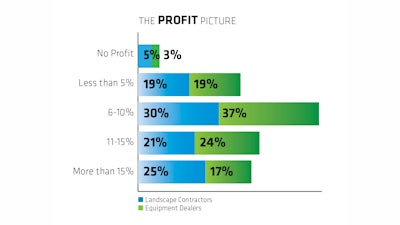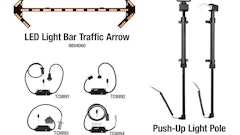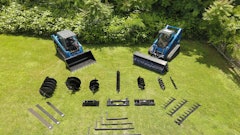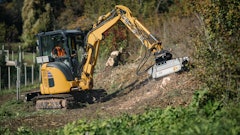
It's pretty safe to say that anyone in business would like to make more money. The question is: How? The short answer is: Charge more and/or spend less. Easier said than done. Many contractors are indeed able to charge more for their services these days, but still not enough to compensate for the 2009 pricing collapse and continually rising cost of doing business. For most contractors, more needs to be done to begin making more money.
We asked members of the Pro Panel what they've found to be the best ways to do just that.
1. Manage labor "to the minute"
"You must ensure that you're properly managing your largest expense, which is labor," reminds Jon Ewing, a former contractor who is now a business consultant. "Avoid unnecessary overtime and staff, and organize your crews correctly and make sure they are well-guided."
One other financial consideration with respect to your field labor, Ewing points out, is safety. It's important to create a safety culture in your organization, which will help keep claims to a minimum.
For Linda Rae Nelson of Greenscapes of Southwest Florida in Naples, FL, she strives to create a productivity-minded culture. "The key to making more money isn't in your financials, it's in your production," Nelson says. "Your financials simply tell you what's going on with your production. Financials are like your report card, showing you the end result of what you've done."
That said, if your report card gives you a poor grade—perhaps because your crews are going over hours—you can start to investigate why. It's not really about the hours, though, Nelson points out. It's about the minutes.
"Every minute counts and every minute that's lost is lost forever," Nelson says. "We look at travel time, traffic flow in our yard, tasks for the day and whether they need a two- or three-man crew, etc. Then we break things down into even smaller pieces. We look at how we set up at night, which includes having materials delivered beforehand. A crew going to a supply house will typically spend 20 minutes in idle time. The list of things like this goes on and on. Your goal should be to eliminate as many stops as possible."
Unbillable idle time is definitely a profit killer. But beyond that, Nelson says, it's also important to search for process improvements that can also save time. "Sometimes the way you lay out your day can save 10 minutes on a trip," Nelson points out. "Think about that. If you could save 10 minutes a day, that's 50 minutes per employee every week. That can add up really fast."
Sometimes contractors want to look for that "big idea" to make them more profitable. "But it's the slightest things that help us go from losing to making money," Nelson says. "Those things are likely happening right there in our businesses, we just have to look for them."
2. Study, measure each job
Going hand in hand with managing labor is understanding job scope and, more specifically, client expectations. "Not only are you selling minutes," Nelson says, "you're basing those minutes on the customer's expectations. I know my people, my culture, and what we're capable of producing." Once you get that in alignment with what the customer expects, you can start estimating and managing better, which sets you on the path toward making more money.
There are other costs beyond labor, of course. Kevin Payne of TenderCare Lawn & Landscape in Derby, KS, runs profit-and-loss statements on every job his crews do. "This keeps us on track and helps us catch problems earlier if we are having an issue with a particular crew or bid a project wrong," Payne says. "We actually did this for years, but got a bit lax during the economic downturn. But it's become very obvious now that this is a very important function to our success as a company."
Aside from identifying problems with crew productivity or estimating/bidding processes, job-by-job P&L's have another benefit. "It gets our employees to really understand the cost of doing business," Payne points out.
"The P&L gets everyone watching expenses, from the smallest to the largest," Payne continues. "I sometimes hear our employees say, 'What can I do to lower this overhead?' Most employees understand that we (company owners) pay for labor and materials, but letting them see what contributes to overhead really gets them thinking. We discuss how lowering certain costs by a few percentage points can really improve the bottom line. All of a sudden you see people worrying about the electric bill and office supplies."
3. Differentiate yourself
Earlier, Nelson was talking about how important it is to understand both client expectations and your employees' production capability. That lets you estimate properly, which is an essential cog in the wheel of financial management.
Chances are, though, that you're still dealing with clients who say, "So and so will do the job for less." This is why the #3 way to make more money is to develop a strategy to differentiate yourself.
"Tout your attributes as a business, whether it is reliable and on-time service, quality workmanship, etc.," Ewing advises. "You should also market the expertise and qualifications of your workforce, including any special certifications, licensing, training, etc."
It's also important, Ewing adds, to really know your customers and what they want, and how they really feel about your company, services and personnel. Once you do, you can better communicate meaningful points of differentiation in your proposals, presentations and other advertising.
For some landscape companies, social media is helping communicate those points of differentiation. "We have adopted the use of Twitter and Facebook, along with e-mail blasts, to help educate our customers about what we offer and how we can help them," Payne relates. "We are beginning to see that customers are once again willing to pay a bit more for quality work. We do not want to be the cheapest bid someone gets. We want to be the most informative, trusted, highest-quality bid the customer gets."
4. Look for upsell opportunities
On the topic of differentiation, having the ability to cross-sell a variety of services is becoming more common for landscape companies—and more valued by many types of clientele. "Being a full-service lawn and landscape provider gives us the opportunity to upsell customers in many different ways," Payne points out.
Identifying upsell opportunities should be the responsibility of not only company owners and account managers, but even crew leaders. "Train your staff to identify those items on projects that can be improved, but are not initially included on the contracts," Ewing recommends. You then should establish a clear process for crew leaders to communicate those opportunities up the chain of command, via work order notations, weekly meetings, etc. Incentives for staff to encourage more enhancement sales can also help.
"Pay attention to timing so you don't miss opportunities," Ewing adds. "For example, some retail properties may benefit from holiday themes at various times of the year. Always look for opportunities and remind customers of the various services you can offer. And don't be afraid to be aggressive with your enhancement pricing. Remember, you're being proactive, procuring material and providing a valuable service."
5. Seek out higher-margin opportunities
Enhancement work can prove to be a boon to your bottom line, which is obviously why it should be a focus of you and your staff. The same can be said for higher-margin work in general.
For example, "Can you provide special lawn care services that command higher pricing?" Ewing asks. Also think about special services you could provide that require a level of expertise or unique equipment, and also have less competition you'll be facing. It's likely that these services will allow for higher margins. "Evaluate your customer list and look for opportunities," Ewing adds.
Speaking of evaluating your customer list, doing so can also help you identify higher-margin customers—along with those you don't make any money on at all. You obviously want to nurture your A and B accounts; those where you're recovering your direct costs and overhead, and also generating profit. You likely want to even keep some C accounts; where you're recovering direct costs and overhead. But you should then identify your D and F clients where you aren't even adequately recovering overhead—and seriously think about whether or not you want to keep them. Generating job-by-job and client-by-client P&L's, like Payne does, can help you make these types of decisions.
6. Buy smarter
Making smarter purchasing decisions is a natural way to make more money. "We meet with our vendors on a quarterly basis," Nelson shares. "We review cost points, incentive programs, rebates, etc. Sometimes just ordering at the right times can have a tremendous payback."
You can also consider implementing actual purchasing policies. "Decide who is authorized to make purchases, and develop a purchase ordering system," Ewing says. "Buy wisely, such as buying items in bulk that are used repeatedly. Seek multiple prices from vendors to ensure fair pricing. Take advantage of all early-pay discounts, when possible. And plan ahead and have orders waiting for you at your vendors to avoid wasteful use of labor; i.e. crews sitting around waiting for their parts or materials to get pulled together."
7. Seek help, steal ideas
The above six ways to "make more money" should help get your wheels turning. Within each of those six areas are countless specific tactical actions you can take. That's why Payne says one final piece of advice is to simply seek out ideas from others who have real life experiences in business and the landscaping industry.
"While we have some very talented staff members to bounce ideas off of, I also rely on a network of people such as consultants, accountants, financial planners, bankers and insurance managers, to name a few," Payne relates. "The problem (for many contractors) is that the passion they have for landscaping is just not enough. You must have knowledge of running a business and what overhead really is in order to understand if you’re really making money. By surrounding yourself with a good network of people, you can really level the playing field.
"Admitting you don’t have the answers or ability to do everything can sometimes be difficult," Payne continues. "Listening to and learning from others who have become successful is one of my favorite things to do. My employees probably get tired of hearing me say: 'Man's greatest attribute is his willingness to change and adapt.' I’m never too old to listen to a better way."





















